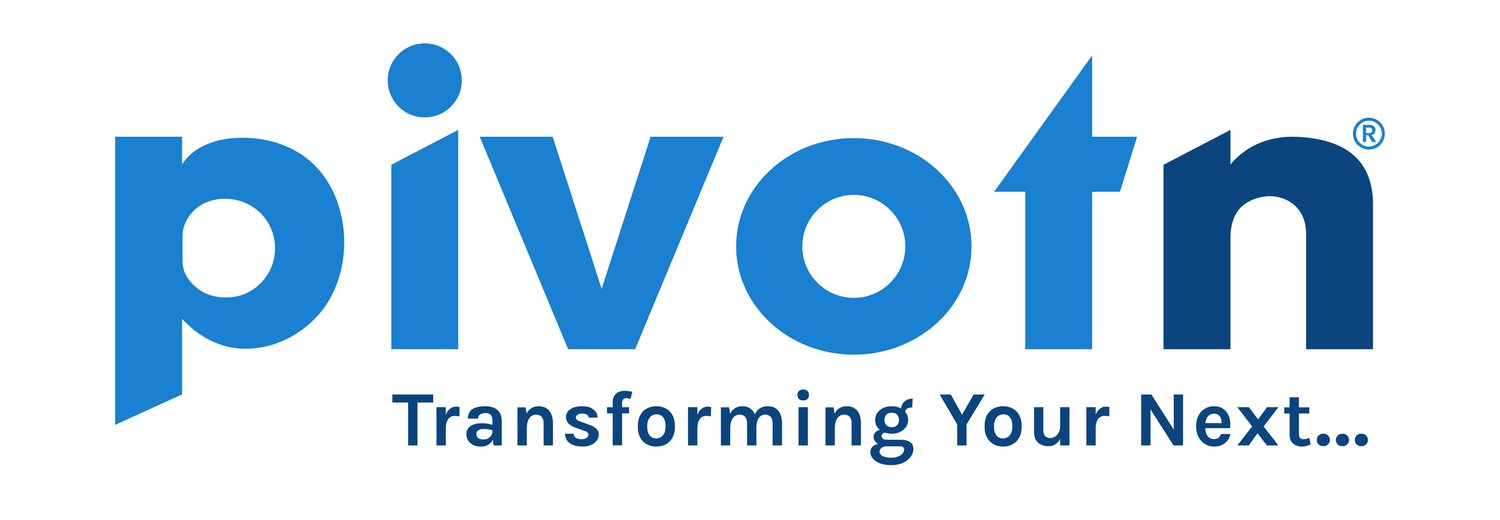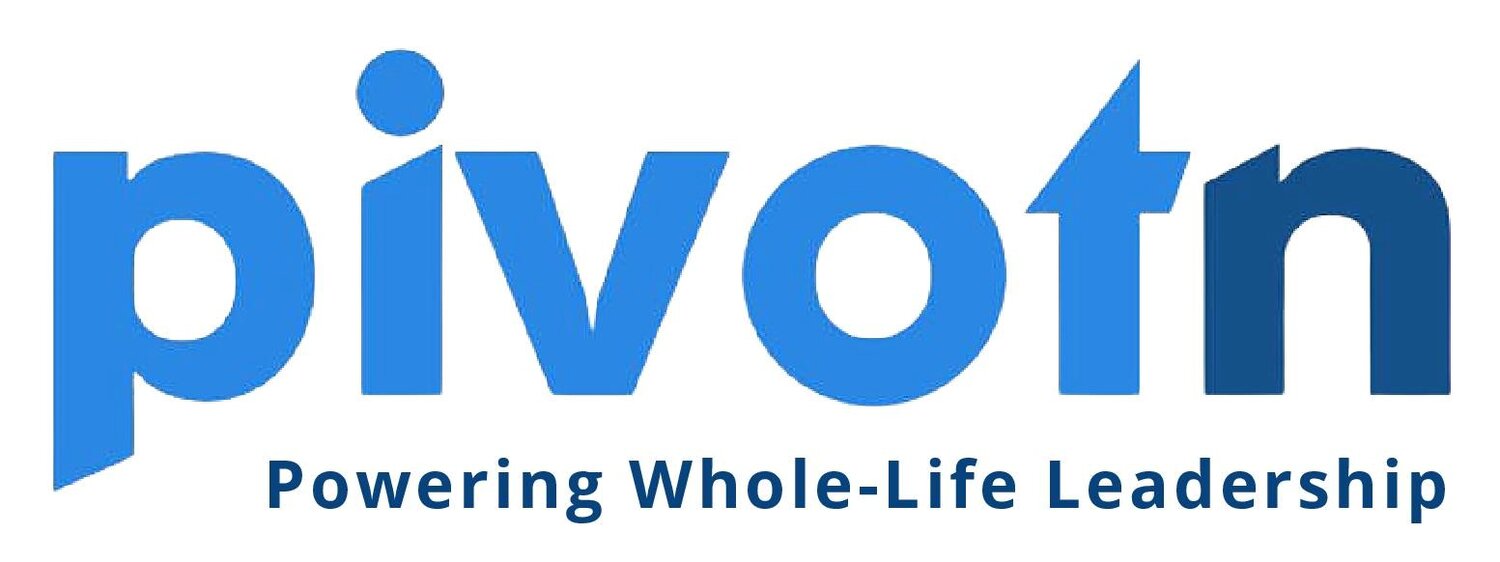Building Courage to Face a Changing Job Market
The job market is changing rapidly as new technologies (including AI models) are developed, markets evolve, and a new generation (Gen Z) enters the workforce. As organizations seek to control costs, workers increasingly express exhaustion and burnout, yet they strive to retain and grow income.
Employees and employers alike need to learn how to cope with these changes. Research indicates that organizations and leaders are still ill-prepared for the current rapid and accelerating pace of change and the future of work. The U.S. Bureau of Labor Statistics has estimated the average time in a single job as a mere 4.1 years. And this time frame is declining.
Helping employees build courage in the face of an ever-shifting workplace is one reason we’ve developed the Pivotn Personal Resilience Process,™ illustrated in the graphic below.
The Pivotn Personal Resilience Process for Job Loss Recovery
We walk clients through this four step-process:
Mourn the Loss. Give yourself time to allow the process to take its course.
Assess your resources. Know yourself, know your resources, and engage with your network.
Embrace the new. Use quick thinking, intentional creativity, and strategic action.
Set smart goals. Create a regimen to hold yourself accountable to specific goals and objectives.
The path to job loss and recovery is certainly challenging, but you can turn it into a gift of growth with those four steps.
What Going Forth with Courage Looks Like
Emotional regulation skills help us face major life changes like losing a job. What we need most when facing uncertainty is a mindset of courageous action.
Courage means going forward when you don’t know what will happen next. It requires letting go of your sight of the shore in order to see the next horizon.
Stressful events can be experienced on an emotional level much more than the actual event warrants. Our conscious mind must work to regulate the survival brain’s reactive and emotional state in these times. With courage, we begin to embrace uncertainty and look for opportunity. Courage helps us better process the inevitable stress of job loss and recovery.
Understand and make the most of the changes in the job market.
One Forbes article called Courage, “The Defining Characteristic of Great Leaders.”[1] It’s what separates leaders from managers.
Provided that most predictions suggest the job market for knowledge workers will continue becoming destabilized in the coming years, we can work with that as an expected condition. We need not be surprised or caught off guard by cycles of layoffs, restructuring, or elimination of certain positions altogether.
Once we recognize the inevitability of forthcoming changes, we can refocus on the questions surrounding how to capitalize on change, and benefit from it on the collective and individual levels. Develop foresight to lead yourself and others through challenges nimbly. Business is full of risks, and jobs – even salaried positions – hold no guarantees.
“In business, courageous action is really a special kind of calculated risk taking”
– Harvard Business Review
Envision what is truly possible for you with exponential growth.
There’s an exciting side of unpredictability – and that is that given the right conditions, you’ll likely go further than you might ever have predicted. A job loss feels big and scary. Yet, it can also be a springboard to your future self.
Leverage the opportunity to do more, be more, and consider your potential paths for “exponential growth.” You’ll likely be surprised to see where you end up when you invest in yourself over time.
Source: Singularity Hub - https://singularityhub.com/2016/04/05/how-to-think-exponentially-and-better-predict-the-future
Learn new skills to cope with changing times.
Anticipating and rebounding from job loss is becoming a skill in itself. New tools and technologies are emerging every day. Don’t wait to learn about them.
If your current company offers certifications and training in emerging areas – take them! Continually investing in yourself while working a full-time job means you’re gaining new skills that will be useful in the future. It’s a win/win – good for you and the business that employs you. You never lose these skills or your potential.
If you’re not currently employed, focus less on “certifications” than “experience.” Develop the skill of diving in to learn more in areas that pique your interest. Check out free resources and seminars offered by libraries and public service organizations.
Learn by doing. You may need a coach or a program, but remember that you can also learn a lot for free. Don’t wait to be hired to learn – be proactive in your own, ever-evolving technical education. On the other hand, once you’ve learned a skill, it’s time to put it to work and be paid for it. Don’t get caught up in consuming new information without applying it for the benefit of others.
Develop an entrepreneurial approach. Don’t get caught up in titles or trying to replace your previous position with something exactly the same duties. Instead, think about the value you can provide to a company. What do they need done? Can you start with a project, and grow it into a full-time role? You get to decide. We can help guide you through these decisions.
Pivotn’s Practical Tips to Protect Yourself from Job Loss Pain
Take the long view when it comes to your career. Follow these tips from our own learned experience:
● Learn your true value. – A lot you’ll read following job loss will focus on your “value” in the marketplace. However, Rather than confusing your identity with your job role, focus on your intrinsic value as a human being, beyond what you do for work. Know that what you earn at any given moment and what you do for a living differ from who you are.
● Build a diverse and flourishing value network. -- Get involved in professional associations and conferences related to your profession. Ask colleagues, friends and family members to introduce you to people they know who may be able to help you in your pursuit of new employment opportunities. You just never know who may be in a position to support you – now or at any given future point.
● Cultivate your career-proof "personal network." -- it's easy to over-focus on career networking while neglecting your "evergreen" support network. Invest time, energy, and effort into your family and friends expecting nothing in return. These are the people who will love you no matter your current situation.
● Stay current. -- Read industry emails, magazines and blogs to keep up with trends that affect the job market. (We see you reading this Pivotn coaching blog. Kudos, you’re already on the right track! Stick with us to maximize your potential.)
● Chart your future path with intention. -- Identify role models you admire. Find mentors and coaches who can help you learn new skills and ways of coping. Know what you want for yourself, beyond any specific job role or even your career.
The Takeaway
Change happens. It's how you handle it that makes all the difference. Embrace change with a sense of courage and adventure by looking to build new skills. Your own personal and professional growth is always within your control.
If you’re finding it challenging to develop courage in the face of job loss, or to strike a balance between learning and earning, please reach out. We would love to help guide you based on our own experiences and the insights we’ve gained by coaching others.
The bottom line: you should never go through job loss alone. Schedule a consultation today.
https://hbr.org/2022/07/reeling-from-a-sudden-job-loss-heres-how-to-start-healing
https://www.mindtools.com/ap6w33w/how-to-recover-from-job-loss
https://www.gartner.com/en/articles/9-future-of-work-trends-for-2023
https://hbr.org/2023/01/9-trends-that-will-shape-work-in-2023-and-beyond




